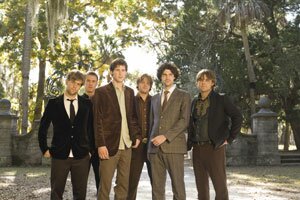CULTURE- FRIDAYS UPDATE Kings of Fridays: Local country boys changing tune?
Fridays After Five is probably the most high-profile gig in town, and King Wilkie mandolin player Reid Burgess is accordingly excited about the opportunity to take the stage at the Pavilion. It's not their first time, though. "We did it a few years ago, when it was in the same spot but without the multi-million dollar makeover," he says.
The humble grassy hillsides of Fridays past were forever transformed with the 2005 raising of the white wigwam, and King Wilkie has been undergoing some changes of its own to match. Started in 2003 by a handful of locals in their early twenties, the bluegrass sextet released their debut album the following year on Rebel Records, which is also home to the incomparable Ralph Stanley. Soon after, they were opening for banjo virtuoso Bela Fleck.
The follow-up disc comes out this June, and preliminary reports indicate that purists might have to go elsewhere. The band's website mentions stylistic links to Leonard Cohen and the Rolling Stones, and they made the album in Los Angeles with a producer who has previously worked for the Dixie Chicks, the reigning queens of twang-ridden crossover success. Their new label is also home to the Cowboy Junkies, if that tells you anything.
"It took a few steps away from the traditional bluegrass," says guitarist Ted Pitney. "We came to the realization that we love traditional bluegrass, but no matter how hard we tried, we'll never be Bill Monroe in 1946."
"It's kind of a departure for us artistically," agrees Burgess.
That statement is almost neutered from the outset by the fact that King Wilkie is a young band– that is, one without enough releases to have established a pattern– but whatever they come up with could still be interesting.
This is, after all, the only bluegrass group known to have promoted their shows by driving around town in a Volkswagen Beetle with a banner draped across the door and megaphones mounted on the roof. It was a clever publicity tactic, but the most telling feature was the fact that it was an original Beetle from the 1960's, not the revamped version introduced in 1998.
"We made a conscious decision to try to find a sound more indicative of who we are," says Pitney of the new album. If their sense of history remains intact, that shouldn't be a problem for anybody.

King Wilkie
Publicity photo
#
1 comment
"We came to the realization that we love traditional bluegrass, but no matter how hard we tried, we'll never be Bill Monroe in 1946."
-------------
Translation: we came to the realization that no matter how hard we tried we weren't going to make any money sounding like Bill Monroe in 1946.
I hate it when bands sellout.